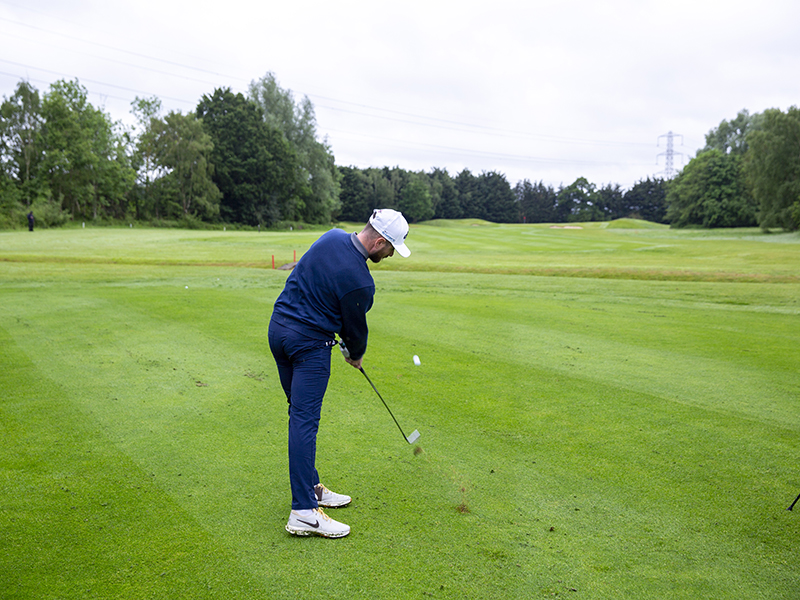I Just Beat My Best Golf Score By 7 Shots... Here's How I Did It
Plenty of golfers will relate to feeling stuck in their pursuit of progress, but these five steps helped me to proactively improve my game...


The pursuit of progress in golf is one the most rewarding, but also frustrating, journeys that I have experienced in any sport. For so many golfers, the addictive feeling of finally hitting a major milestone is something that cannot be replicated, and is the reason we keep coming back for more.
Finding the game in my late twenties, as a relatively good all-round sportsman, I naively assumed I would quickly pick it up and start to see my handicap come down. However, like many, I found the process to be much more arduous and at times, after not getting any better, I felt like tucking the clubs away in a dusty corner of the garage.
Instead, I decided to take a more proactive approach... and I am so glad I did. In the past six months, I've noticed an improvement in my swing, my scores and my confidence on the course, and while I know I still have a very (very) long way to go, I am now, once again, looking forward to the challenge.
In this article, I share 5 steps that helped me to not only hit my first major milestone as a high-handicap golfer (breaking 100), but also very recently to beat my best ever round by a massive seven shots...
1. Custom Fitted Clubs
Having the right equipment in your bag will allow you to have the best chance of making improvements to your swing and performances, but for many golfers this seems to be the last thing on their mind.
Whether you inherited some clubs from a friend or family member, or you are still playing with a set that has more than enough mileage on the clock, it might be time to consider an upgrade... and a custom fit is a great way to do that.
I recently went through the process at American Golf, which not only was quick and easy but also allowed me to get some expert feedback. The data and insights gathered during the fitting allowed me to better understand my game, and my faults, and ultimately I came away with a fantastic set of Benross Delta XT clubs that I new I could trust on the course.
Get the Golf Monthly Newsletter
Subscribe to the Golf Monthly newsletter to stay up to date with all the latest tour news, equipment news, reviews, head-to-heads and buyer’s guides from our team of experienced experts.
In their first round out of the box, my new gear didn't let me down. A score of 92 round Moor Hall Golf Club was my best ever by seven shots, and I couldn't believe how much my strike had improved.
Clearly, all problems can't be solved by a shiny new toy or two (I've been down that road before too!), but it certainly helps to have the tools you need to shoot lower scores.
2. Lessons
If pressed, I would sum up my first season's performances as a club member in one word... dismal. I was hoping to see immediate progress after playing more regular golf, but if anything I felt like I was going backwards.
Over the winter, and in preparation for the 2024 golf season, I decided to invest in some lessons with one of the PGA professionals at my home club, Glen Ient. Despite my desperation and summation that I was helpless, my first lesson went really well. From the first couple of swings, Glen put my mind at ease and reassured me that I had something to work with.
Over the course of a few months, we addressed a number of common faults in my set-up and swing, and I was shocked at how well I could (sometimes) strike the ball. Like many golfers, consistency still eluded me, but I knew that I had slowly built a dependable swing that I could work with moving forwards.
Through the use of video recordings, data analysis and some really engaging homework (drills), I felt empowered to spend time between lessons embedding the necessary changes, and having Glen on hand to answer any questions was an invaluable tool.
For some, the thought of getting lessons can be daunting, as there is a feeling that you could be opening yourself up to scrutiny. My experience couldn't have been more different, and I would implore anyone to seek the advice of your local PGA professional to help you reach your goals.

Even the best players in the world, Like Rory McIlroy, work with a coach to improve their game
3. Practice
You can spend all the money you want on new clubs and schedule all the lessons you can get, but without practising it will take a lot longer to see improvements. After my less than encouraging first season as a member, I decided to invest some time in improving my swing.
Whether you fit practice in by waking up early, shooting out over lunch, or squeezing in a twilight session, heading to the range a few times a week will help you to find the gains you are looking for.
There is a caveat to that, however, as turning up and smashing a bucket of balls without a plan is a massive waste of your time. Try instead to allocate sessions to different areas of your game, and use the best tips and drills to create some some structure.
Over the winter and into the spring, I decided to spend two sessions on my technique and ball-striking, one on my short game and one on my putting per week. Each session was only around 30-45 minutes long, so you could easily combine two sessions back-to-back if you are unable to visit the golf club as frequently.
Practice is a commitment, and one that I know many golfers find hard to factor in to an already busy schedule, but finding time for even one visit a week will help you to hone your skills and see some improvements.
4. Play Different Courses
I have been a golf club member for around 18 months now, and despite looking forward to playing my home course every week, I still feel it's important to play other tracks as you look to improve your golf game.
Having a variety of challenges and environments can help to keep your mind focused, with different strategies needed to be successful at other venues. I've found that playing another course, especially after a run of poor rounds, can help to unburden my brain of the negative feelings I have attached to my performance, and allows for a much-needed reset.
Meeting new people and seeing new sights is a key part of what makes the game of golf special, so I believe a bit of wanderlust is something to be encouraged. With the digital scoring systems now in place through England Golf or IGolf, it's also possible to enter a scorecard and continue your valiant efforts to reduce your handicap... if you are brave enough!

Barry playing a shot at Burhill Golf Club
5. Be Resilient
This one is last, but certainly not least. As a new golfer, I know I am not alone in saying I could have given up the game on so many occasions. At times I felt as though I was walking into a futile fight I couldn't win every time I stepped on the tee, and I had lost enjoyment for the game.
But then something happens, and that spark returns. It can be something as insignificant as a birdie on the last to shoot 108, or crushing a drive after making a triple-bogey, but it's that feeling that draws you back in.
Giving up on a game that offers so much in the way of physical and psychological benefits would have been a huge mistake, and I now consider myself a life-long golfer with plenty of optimism for future progress in the sport.

Barry joined Golf Monthly in January 2024, and now leads the instruction section across all platforms including print and digital. Working closely with Golf Monthly's Top 50 Coaches, he aims to curate and share useful tips on every aspect of the game - helping amateurs of all abilities to play better golf. A member at Sand Moor Golf Club in Leeds, he looks forward to getting out on the course at least once a week in the pursuit of a respectable handicap.
Barry is currently playing:
Driver: Benross Delta XT Driver
Hybrid: TaylorMade Stealth 4 Hybrid
Irons: Benross Delta XT 5-PW
Wedges: TaylorMade RAC 60, Callaway Jaws MD5 54
Putter: TaylorMade Spider Tour
-
 Hye-Jin Choi Facts: 10 Things To Know About The LPGA Tour Pro
Hye-Jin Choi Facts: 10 Things To Know About The LPGA Tour ProHye-Jin Choi had a glittering amateur career, and she’s taken that into her professional journey, with a host of wins – here are 10 things to know about her
By Mike Hall
-
 Yan Liu Facts: 10 Things To Know About The LPGA Tour Pro
Yan Liu Facts: 10 Things To Know About The LPGA Tour ProYan Liu has been making solid progress in her professional career – here are 10 things to know about the LPGA Tour golfer
By Mike Hall